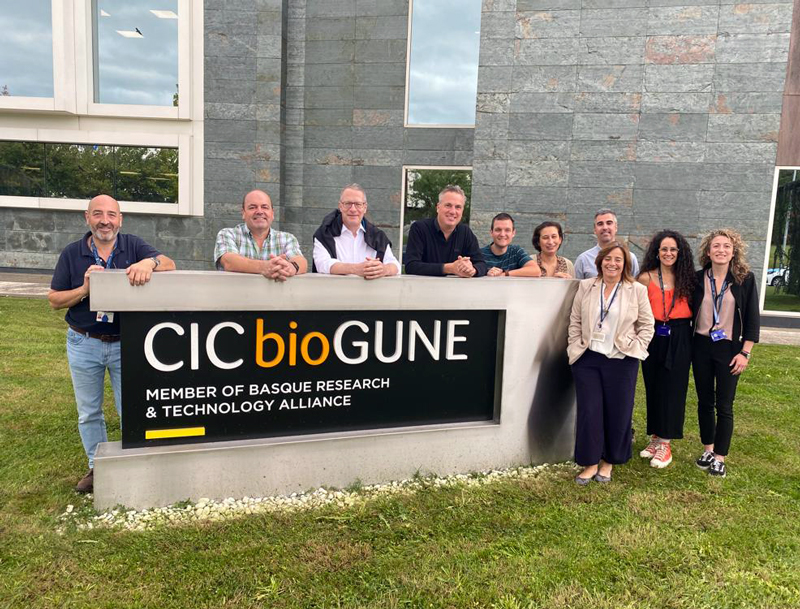
2023/10/23
International partnership for the understanding of rare diseases and cognitive disorders through magnesium transport insights
Researchers from the Liver Disease lab at CIC bioGUNE in collaboration with researchers from Biobizkaia Research Institute, Hipofam Patients Association (Barcelona), McGill University (Montreal), Radboud University (Nijmegen) and Charite (Berlin), concluded a three-day workshop within the framework of the European Joint Action on Rare diseases FIGHT-CNNM2.
The event, held on October 19th to 21st, focused on the multidisciplinary study of Magnesium associated pathologies, including rare hipomagnesemias, associated cognitive disorders and cancers, and provided a unique opportunity for participants to gain state-of-the-art knowledge and share the latest findings of the most recognized experts in this field.
The Liver Disease Laboratory, led by Malu Martínez-Chantar and Luis Alfonso Martínez de la Cruz, located at CIC bioGUNE - member of BRTA -, alongside with Dr. Javier de las Heras, from Biobizkaia Research Institute (Bilbao) and Dr. Antonio Cabrera from Hipofam Patients Association (Barcelona) have organized a three-day multidisciplinary workshop. This event had the active participation of experts from renowned international entities such as McGill University (Montreal, Canada), Radboud University (Nijmegen, The Netherlands) and Charité (Berlin, Germany).
The workshop marked an intensive exploration into molecular mechanisms and proteins involved in the transportation of magnesium ions across cell membranes. Particularly, placing a prominent focus on elucidating the crucial role played by the Cyclin M, also known as CNNM, ion transporter protein family.
This pioneering initiative was carried out under the auspices of a collaborative, multinational, and multidisciplinary consortium known as FIGHT-CNNM2, generously funded by the European Union and the Institute Carlos III. The profound insights garnered from this research endeavor have significantly advanced our understanding of pathologies linked to the compromised activity of this protein family. Such pathologies encompass rare hypomagnesemias, severe cognitive disorders, and certain types of cancers.
This collaborative initiative served as a unifying force, drawing together experts and enthusiasts from diverse corners of the scientific community to explore the intricacies of magnesium transport across the cell membranes and harness the profound insights offered by this international, multidisciplinary consortium.
The workshop, held from 19th to 21st of October, gathered scientists and researchers embracing the opportunity to venture into the realm of magnesium transport research. The event provided a unique opportunity for participants to gain hands-on experience with state-of-the-art research tools designed for interpreting data generated by modern technologies, including structural biology, cell and molecular biology, biochemistry, and biophysics. These disciplines play a pivotal role in uncovering the hidden secrets of magnesium transporters and their impact on cellular processes.
Participants were treated to specialized lectures that not only deepened their understanding of magnesium transport but also shed light on the myriad technologies and tools available for data interpretation. These informative sessions offering valuable insights and perspectives on the latest developments and were led by renowned experts in the field, such as Dr. Malu Martínez-Chantar and Dr. Luis Alfonso Martinez de la Cruz, Principal Investigator and Associated Principal investigator at CIC bioGUNE, respectively.
One of the workshop's key highlights was the discovery of new roles played by the CNNM family of magnesium transporters in the development of pathologies previously unassociated with these proteins. Additionally, the workshop shed light on their biological functions in various organs.
About CIC bioGUNE
The Centre for Cooperative Research in Biosciences (CIC bioGUNE), member of the Basque Research & Technology Alliance (BRTA), located in the Bizkaia Technology Park, is a biomedical research organisation conducting cutting-edge research at the interface between structural, molecular and cell biology, with a particular focus on generating knowledge on the molecular bases of disease, for use in the development of new diagnostic methods and advanced therapies.
About BRTA
BRTA is an alliance of 4 collaborative research centres (CIC bioGUNE, CIC nanoGUNE, CIC biomaGUNE y CIC energiGUNE) and 12 technology centres (Azterlan, Azti, Ceit, Cidetec, Gaiker, Ideko, Ikerlan, Lortek, Neiker, Tecnalia, Tekniker and Vicomtech) with the main objective of developing advanced technological solutions for the Basque corporate fabric.
With the support of the Basque Government, the SPRI Group and the Provincial Councils of the three territories, the alliance seeks to promote collaboration between the research centres, strengthen the conditions to generate and transfer knowledge to companies, contributing to their competitiveness and outspreading the Basque scientific-technological capacity abroad.
BRTA has a workforce of 3,500 professionals, executes 22% of the Basque Country's R&D investment, registers an annual turnover of more than 300 million euros and generates 100 European and international patents per year.
About Biobizkaia
Biobizkaia is the Health Research Institute of the Territory of Bizkaia, within the Basque health system, with a catchment area of over 1 million population. It aims to be recognized as a translational research and healthcare innovation center, serving as a regional and national reference, leading international high-impact projects, and acting as a hub for attracting clinical, research, and innovative talent. The mission of Biobizkaia Institute is to enhance translational research and healthcare innovation to create value and make an impact on health for society.
About the Hipofam Patients Association
Hipofam is an association founded in 2014 by two families affected by hereditary hypomagnesemia in Spain. Over the course of ten years, it has grown to have 57 members representing 46 affected individuals, including Gitelman syndrome. Its goal is to raise awareness about these rare conditions, support those affected and their families, and improve treatments and quality of life.
See a large version of the first picture





